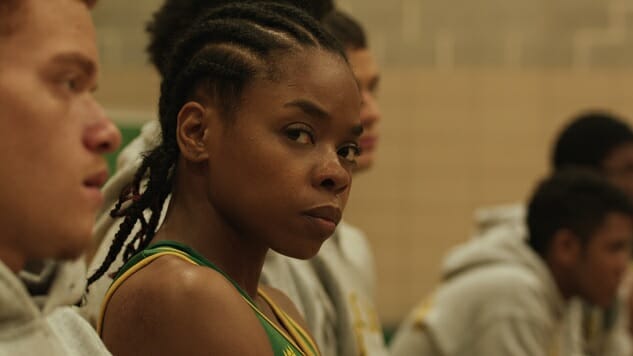First Match

A youth spent facing fatherhood in absentia and tumultuous foster care situations demands a tough front. A tough front goes a long way when you’re trying to protect yourself. It goes even further in a wrestling ring or a bare knuckle boxing match, and in Olivia Newman’s excellent First Match, wrestling and boxing mean two different things: The former a chance at belonging to a surrogate family, the latter a chance at reconnecting with that absent father. If reunited with dad sounds like a great deal upfront, it’s also the sharpest double-edged sword of all when he doesn’t want much to do with you until he sees your pugilism as a way of making a fast buck.
Describing Newman’s film in terms of the contrast it strikes between emotional and physical pain does it a disservice. It’s true that Newman affixes that contrast to her story’s core, and that her protagonist, Monique (Elvire Emanuelle), endures plentiful suffering in both categories, being both lonely—by her own choosing and also as a consequence of the shit hand life has dealt her—and frequently subject to bodily duress. If she isn’t taking on girls in her high school’s hallways, she’s taking down boys on wrestling mats. Eventually she’s taking shots to the face, which brings us back to the subject of her dad, Darrel (Yahya Abdul-Mateen II), and uneasy questions about his parental suitability resting at the film’s core. Maybe Monique was better off without him around.
We meet 15-year-old Monique as she’s given the boot from her most recent foster home, the inevitable conclusion to her affair with her guardian’s boyfriend. The guardian launches Monique’s clothes from her apartment window in volleys lapped by her scorned invective. Before we can fully process what we’re seeing on screen, the scene ends and Monique’s onto the next home, where she immediately pilfers a pair of earrings from her new caretaker, Lucila (Kim Ramirez). It’s not the most flattering introduction to a character as introductions go, but Newman and Emanuelle are walking a tightrope here: They’re finding space for empathy without frosting over Monique’s behavior, suggesting that her circumstances inform her actions while emphasizing that she’s more than her actions.
The balancing act is mostly Emanuelle’s. She’s tasked with giving away nothing while showing us everything. There’s a very lonely person nesting beneath her steely exterior, and if Emanuelle has no qualms acknowledging Monique’s isolation, she also refuses to ask us to feel sorry for her in even her darkest moments. That’s proof of Emanuelle’s quality as an actress: From start to finish, her eyes remain liquid with things left unspoken. It’s also evidence of Monique’s resourcefulness. This young woman is capable of arguing her way into a spot on her high school wrestling team, first persuading Coach Castile (Colman Domingo), then later—much, much later—persuading her teammates that she’s one of them, a scrapper, a winner, a champion. Getting Castile on board is, perhaps unsurprisingly, the easier task.